Summary
– Nearly all supplements marketed as pre-workouts contain caffeine or some other stimulant, but there are ingredients that can support exercise performance with little to no stimulant effect.
– Huperzia serrata, arginine and citrulline, cordyceps, rhodiola rosea, essential amino acids, sodium bicarbonate, and chocolate milk may all help performance when consumed before activity.
– Ingredients may need to be taken at different times to maximize their effects.
– Pre-workouts are generally considered safe, but there is little research on their long-term effects.
Caffeine-Free, Non-Stimulant Pre-workouts: Do They Work?
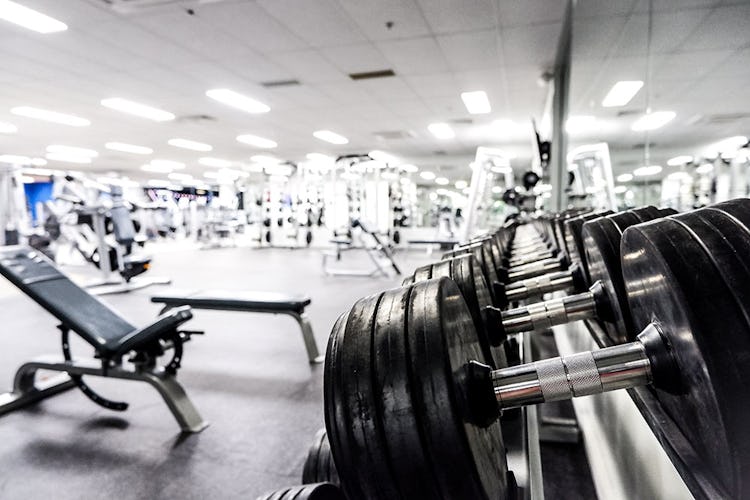
If there’s one common denominator underlying most nutrition products that are marketed as pre-workout supplements, it’s the inclusion of caffeine. The majority of pre-workout formulas that have been shown to be effective contain some amount of the stuff, and the fact is that the pre-workout category was born for the sake of helping people feel more energized when they go into the gym. But not every supplement designed to be taken before training is intended to have a stimulant effect.
If you’re someone who chooses to avoid caffeine, or you want something besides alertness and focus from your pre-workout supp—such as a better pump, or support with endurance or strength gains—you have other options. We looked into the best caffeine-free, non-stimulant pre-workouts that may help you perform well without a high risk of feeling wired.
Do Caffeine-Free Pre-workouts Actually Work?
First thing’s first: there is a strong body of evidence showing that pre-workout supplements of all kinds can help you achieve fitness goals. A 2018 review in the Journal of the International Society of Sports Nutrition looked at 80 different studies done on pre-workout formulas and concluded that they may benefit both muscular endurance and mood during a workout. The authors noted that, when combined with resistance training, pre-workouts can support positive long-term changes in body comp via lean muscle gains.
Nevertheless, most pre-workout formulas contain a mix of ingredients, so trying to pick out exactly which ones are having the intended effect versus those that don’t live up to the hype, or are mere filler, has presented a challenge for scientists. Furthermore, most pre-workouts contain caffeine, and lots of it (upwards of 300 milligrams in a dose—equal to about three cups of coffee). As caffeine has been shown to promote power output, endurance, and alertness, and aid the body in managing stress in multiple ways, it can be difficult to tell what’s really working in a given supplement: the “proprietary blend,” or the caffeine.
With that said, there are several other ingredients that are common in pre-workouts that have been found to be beneficial, although not for the stimulant effect that caffeine promises. We’ll explore these further down under How Do Most Pre-Workouts Work?
What Pre-workout Supplements Contain Stimulants?

It’s important to understand that caffeine isn’t the only stimulant that might appear in a supplement. Many supplements may claim to be caffeine- or stimulant-free but can still have a stimulant effect, especially if a person is sensitive to one or more ingredients. The body’s reaction to any kind of supplement can be very individual.
Most people think of stimulants as chemicals that raise heart rate and ramp up the central nervous system, but the category is broader than that. The FDA defines a stimulant as a drug or substance that helps restore mental alertness or wakefulness in a fatigued state, so, going by that, virtually any product that helps you feel more mentally energized can be considered to have a stimulant effect.
Don’t misinterpret “caffeine-free” on a label as stimulant-free. If you want something that’s completely sans stimulants, you’ll have to be sure it says so on the bottle, and check that the label’s promises have been vetted by a third-party such as Informed-Sport, which tests supplement batches to determine their safety and purity. However, if you’re on the hunt for stimulant-free pre-workouts simply because you have a problem with caffeine, you may find that you don’t mind a supplement that contains other compounds that may act as stimulants, but have a less-potent stimulant effect.
Technically, the following ingredients fall under the stimulant banner (largely because most contain some amount of caffeine), so, if you’re concerned about consuming stimulants, be wary of any product that advertises them.
- B-complex vitamins
- Caffeine/caffeine anhydrous
- Carnitine
- Cocoa
- Ginseng
- Green coffee bean
- Guarana
- Ma huang
- Taurine
- Yerba maté
- Yohimbe/yohimbine
You can find a more complete list on the Operation Supplement Safety website, a division of the U.S. Department of Defense.
At the same time, be aware that all of these compounds are considered safe by the FDA when consumed by adults in moderation. They’re not controlled substances that can get you in trouble or pose serious risks to your health, provided that you’re a typical healthy adult. And if you consume energy drinks, sodas, or teas, or you eat chocolate, you’ve probably ingested some of these ingredients before.
How Do Most Pre-workouts Work?
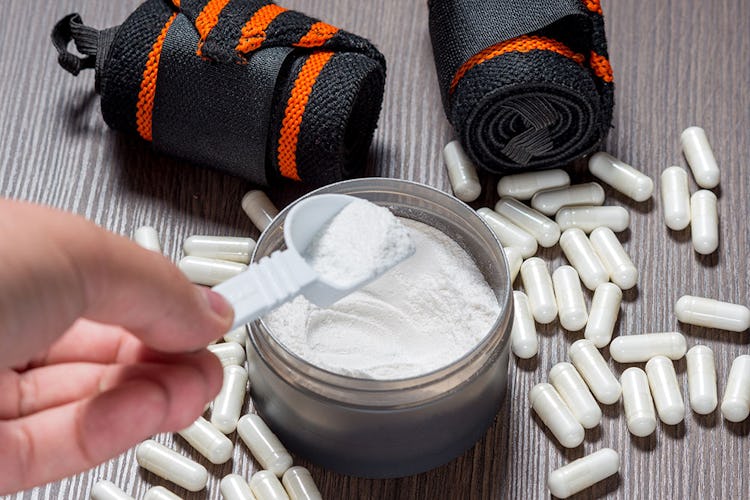
Supplements can prepare you for more effective workouts by many different means. The following are some of the ingredients that science has shown to have the most promise for promoting higher performance.
Huperzia Serrata (Club Moss)
If you’re interested in a pre-workout for the sake of mental energy, alertness, or focus, but you want to steer clear of caffeine and other stimulants, club moss should be on your radar. We can’t promise that it won’t have any stimulant effect in your body, but it’s certain to be less stimulating than massive amounts of caffeine, as its effects support a brain environment that allows for clear thinking—it doesn’t cause a ramp-up of the nervous system.
Huperzia serrata has been shown to have neuro-protective properties, helping to support cognitive function. It can also promote concentrations of acetylcholine, the neurotransmitter responsible for muscle functions. Huperzia serrata is a key ingredient in Alpha BRAIN®.
Arginine and Citrulline
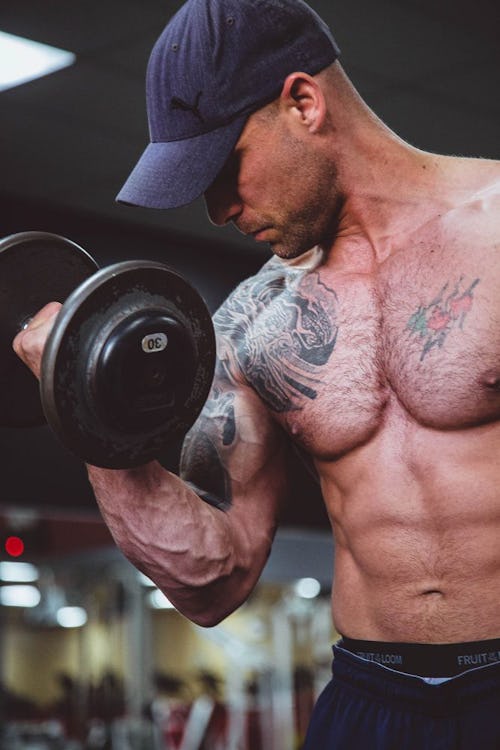
Nitric oxide (NO) supplements are some of the most popular in the stim-free pre-workout category. They don’t act directly on the brain or central nervous system but instead on the vascular system, dilating the blood vessels to allow greater blood flow to working muscles. If you can get more blood in and out of your muscles during training, you can potentially deliver more nutrition to them and promote better performance and recovery. For gym rats who like to get a big ego-inflating pump from their strength workouts, NO supplements have the potential to make your muscles swell to an even greater degree.
Nitric oxide exists naturally in the body, but you can’t supplement it in that form. To raise NO levels, you need to take the amino acids L-arginine and L-citrulline (also available as citrulline malate).
A study in the Journal of Applied Physiology showed that joggers who used arginine were able to extend their runs by more than two minutes. Another trial in the European Journal of Nutrition demonstrated that citrulline malate helped women perform more volume on the leg press exercise (an increase of 12 reps in a single workout).
Vasodilation (the condition of dilated blood vessels) helps the bloodstream shuttle metabolic byproducts out of the muscles more quickly. These byproducts can contribute to muscle soreness. A study in the Journal of Strength and Conditioning Research found that when lifters took citrulline malate before training, they were 40% less sore one day—and then two days—later.
Arginine and citrulline may also help your workouts seem less grueling. A 2019 study concluded that a combo of both aminos assisted with power production in soccer players training on a cycle ergometer and, despite their putting out a greater effort, the subjects reported that the workout felt easier than sessions in the past. A 2016 study’s findings were similar—cyclists reported less fatigue after a workout.
You can read more about arginine and citrulline in our guide to nitric oxide supplements.
Cordyceps

A type of fungus that grows in the Himalayan mountains, cordyceps sinensis (and its less expensive lab-grown alternative, cordyceps militaris) are rich in adenosine triphosphate (ATP)—the energy source for muscle contractions. As a result, cordyceps may help the body produce more ATP, which could allow you to train more intensely.
A Chinese study indicated that cordyceps supports gains in aerobic fitness, as subjects cycling on stationary bikes saw a seven percent increase in VO2 max in just six weeks. A similar study in Japan found that cordyceps helped individuals train more efficiently on a running test.
In 2017, researchers had cyclists take a mushroom blend that contained cordyceps; the subjects had longer times to exhaustion (by about 28 seconds) after only one week of supplementation, and their VO2 maxes shot up by 11% after three weeks of supplementation.
Read more on cordyceps in our cordyceps sinensis report.
Rhodiola Rosea

Rhodiola is an herb with adaptogenic properties, meaning that it can support the body’s management of stress. Scientists hypothesize that it may aid performance by helping the heart keep up with demand, but rhodiola also seems to help with perceived levels of exertion. A Journal of Sports Medicine study found that rhodiola supplementation before cycling helped subjects train hard (70% of VO2 max) without feeling like it was so intense.
Another trial revealed that, when taken one hour before activity, rhodiola promoted work capacity, helping users extend their time to exhaustion on endurance exercise by 24 seconds.
Find out more in our rhodiola rosea guide.
Essential Amino Acids (EAAs)
EAAs are amino acids your body can’t synthesize, so you have to get them from food or supplements. There are nine of them: histidine, isoleucine, leucine, lysine, methionine, phenylalanine, threonine, tryptophan, and valine. Three of these—isoleucine, leucine, and valine—are known as branched-chain amino acids (BCAAs), which scientists recognize as being especially important for strength and performance.
Research from Applied Physiology, Nutrition, and Metabolism demonstrated that BCAAs taken one hour prior to running tests supported better reaction times in soccer players. Furthermore, Nutrition published a study showing that women who took EAAs before and after training, and on off days as well, saw gains in aerobic endurance. What makes this even more impressive is that the subjects were eating roughly 400 fewer calories daily than the ladies in the placebo group, which suggests that EAAs might help performance when dieting.
Sodium Bicarbonate
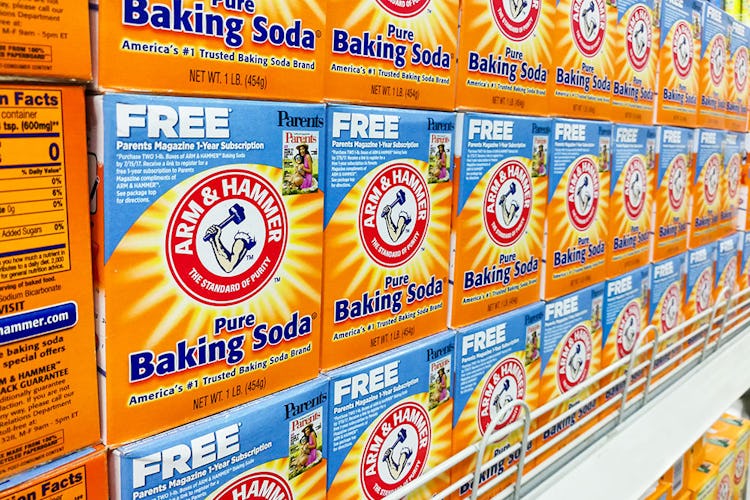
This is plain, old-fashioned baking soda, and while it’s still great for keeping your refrigerator smelling fresh, it can also help you keep your intensity up on your cardio. Sodium bicarbonate has an acid-buffering effect, and several trials (1, 2, 3) have shown that it promotes faster finishes in sprint and middle-distance cycling and running tests, where athletes are likely to slow down or become distracted by the searing feeling of lactic acid buildup (the byproduct of your body burning stored carbohydrate for energy).
However, some people find that sodium bicarbonate upsets their stomach, and if you’re watching your salt intake, you’ll want to avoid it outright.
BONUS #1: Beta-alanine and Creatine
There are many other safe and legal performance aids that are also caffeine-free, but the timing of their ingestion doesn’t matter. In addition to the above, you may find that beta-alanine and creatine (amino acids) help you to perform more reps in your strength workouts. While they’re popular ingredients in many pre-workout products, they can be consumed before or after training, and on off days, and need to build up in your system over time before they can take effect.
You can read about them in our separate creatine and beta-alanine articles.
BONUS #2: Chocolate Milk
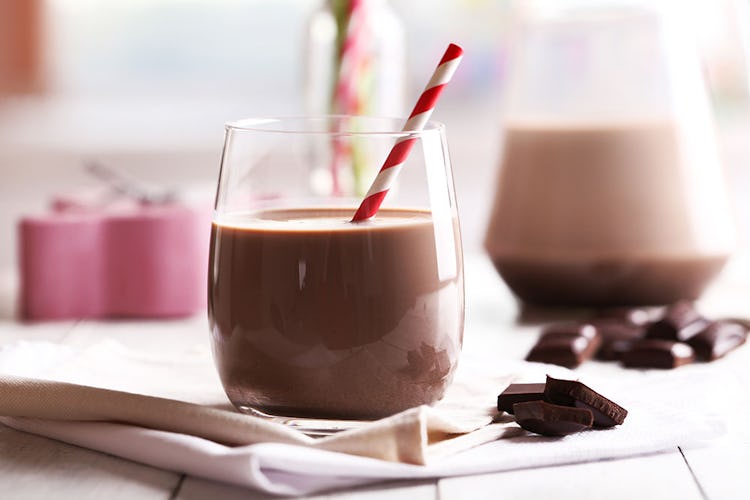
If you’re really concerned about keeping stimulants of any kind out of your diet, or you just don’t like swallowing powders or pills, you can eat like a kid again and tell your friends it’s highly sophisticated performance nutrition. “A drink with a little bit of protein and carbs 30 to 60 minutes before training can provide energy,” says Chris Mohr, Ph.D. R.D., a nutrition and wellness consultant (follow him on Instagram, @mohrresults), “and chocolate milk is perfect. That’s what I do when I work out in the morning, but you can drink it anytime. The protein helps prevent too much muscle breakdown during your workout, and the sugar provides quick energy. I like a low-sugar chocolate milk, like Fairlife’s Chocolate 2% Ultra-Filtered, which has about a 1:1 ratio of protein to carbs.” (There are 13 grams of protein and carbs in an eight-ounce serving, and Mohr drinks the 11.5-oz single-serving bottles.)
When’s The Best Time To Take A Pre-workout?

You’re probably best served by following the label directions on any pre-workout product you use, but Vince Kreipke, Ph.D.—a performance specialist and member of Onnit’s advisory board—cautions that different ingredients kick in and peak at different times, so, for the best results, you’ll have to time your consumption accordingly.
“Optimal timing is going to depend greatly on the speed at which the ingredients are absorbed and ready to be used by your body,” says Kreipke. “This is going to be somewhat variable when you look at different ingredients. Arginine has been shown to reach peak concentrations at one hour after ingestion, whereas the active ingredients in rhodiola rosea weren’t shown to peak out until about two hours.” Timing is everything.
A recent study demonstrated that optimal muscular performance via caffeine use is achieved when caffeine is consumed one hour before performance (it beat 30 minutes and 2 hours in the study). “Caffeine has been shown to be 99% absorbed within about 45 minutes,” says Kreipke. “If we take that in and use that as the model, it would suggest that peak absorption means peak benefits.”
So, if you want to take more than one of these ingredients before your workout, you may want to do a little bit of planning—such as taking rhodiola one to two hours before, and then arginine and caffeine a little later. It’s also important to know that ingredients can stay in your system for a while once they have been absorbed. Caffeine, for example, has a half-life of about six hours, meaning that it takes that amount of time for the concentration in your system to drop to 50% of the initial dose. If you take a pre-workout that packs a lot of caffeine, that’s a long time to have high levels of caffeine in your body. (This is one reason it’s wise to avoid pre-workouts with caffeine at night, so they don’t prevent you from sleeping.)
Are Pre-workouts Bad For You?
Overall, research suggests that pre-workouts are safe, and that adverse effects are generally mild. Subjects sometimes report stomach upset and trouble sleeping, or a general decrease in calmness, although the latter applies more to pre-workouts that contain caffeine.
Research on pre-workouts is young, however, and most studies haven’t looked at the effects of long-term use (pre-workout formula trials tend to run for eight weeks or less). For maximum safety, consumers would be wise to research any supplement they’re interested in before use. Due to weak enforcement of FDA regulations, supplements of all kinds have been found to contain many things they shouldn’t, including heavy metals, hormones and prohormones, banned substances, harmful chemicals, and stimulants (1, 2).
An article in the New England Journal of Medicine points out that hidden stimulants may be the most common problem, and that dosages can range from negligible to toxic levels.
For these reasons, it’s best to look for products that have received third-party verification (as mentioned above), and are transparent about their ingredients. “Look for a seal that says it’s certified for sport by a group like Informed Sport or NSF,” says Mohr.
Pre-workouts Banned By The NCAA

If you’re a student athlete, you should know that the NCAA expressly bans the use of all stimulants, including caffeine in large quantities. If you like to have coffee in the morning or a Diet Coke at lunch, you needn’t worry, as urine concentrations of caffeine would have to test in excess of 15 micrograms/ml for you to get busted, which would mean consuming around 500 milligrams of caffeine (or the equivalent of six to eight cups of coffee) two to three hours beforehand.
It gets tricky, though, if you consume normal amounts of caffeine and a pre-workout on top of it. As many pre-workouts pack 300 or more milligrams of caffeine, as well as other potential stimulants, your chances of “pissing hot” go up significantly. So read labels, and be cautious.
Also, “make sure that whatever supplements you use you experiment with beforehand on practice days,” says Mohr, “not performance days.” A competition is no time to test-drive a new formula whose effects on your body are unknown.

)






